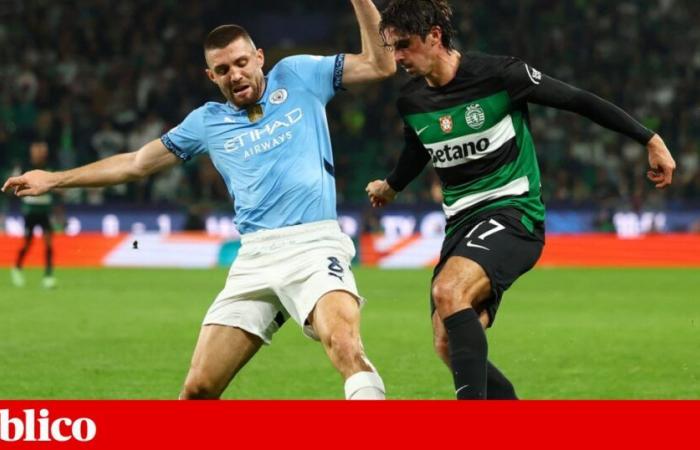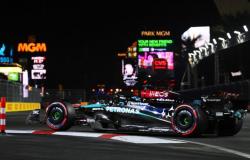This Tuesday, at Sporting-Manchester City (4-1), the “lions” spent long minutes in permanent torture – and they can thank goalkeeper Israel for the game not ending too soon.
These minutes served as a learning experience and, from one moment to the next, Sporting (and Amorim) went from student to teacher. The Lions realized that City’s football had tremendous strengths but a clear weakness – and they exploited it time and time again.
Was it recommended by Rúben Amorim? The most romantic – and United fans – will want to think so, and they may well be right, but the important thing is that Sporting understood the path they should follow.
The last hour of the game was one of the best we’ve ever seen from Portuguese teams in Europe, destroying City in Alvalade.
Massacre
What happened in Alvalade until half-time was little less than a massacre – caused by a problem that was difficult to solve.
City right-back Rico Lewis has never been a full-back and has almost always played as a central midfielder. This detail, combined with Sporting’s 5x3x2, facilitated the defensive fit of Maxi Araújo, who knew that “his” player was Savinho and had no two-on-one situations.
The problem is that this comfort for the “Leonine” defenders only existed because there was a deep discomfort further ahead. With Pedro Gonçalves, Trincão and Gyokeres included in City’s three-way lineup, Sporting didn’t know what to do with Kovacic, the number 6, and Rico Lewis, who was a second midfielder.
Did Morita and Hjulmand come out under that pressure? If so, Bernardo and Foden had 30 meters to play behind the midfielders. If Morita and Hjulmand didn’t leave, Kovacic and Lewis would play “in a chair” behind Sporting’s attacking line.
Basically, the “lions” didn’t have the team starting in two, as often happens, but in three, because the defensive line didn’t go up and the attacking line didn’t go down – and Morita and Hjulmand were always at the center of a merry-go-round of a English team that appeared to have 14 players.
This option, based on the conviction that defending with ten players behind the ball line was not a solution, was a permanent ordeal.
Describing City’s scoring opportunities would be tedious, so let’s stick with the goal scored in the 4th minute. Morita lost the ball, possibly unaccustomed to receiving the ball on the right midfield (he usually plays on the opposite side, with Hjulmand on the right). Foden recovered, shot and scored.
Width space
Offensively there was very little about Sporting. There was no Inácio for vertical passes and there was no Bragança to provide more solutions between the lines – Amorim said that as Sporting would play lower, Morita would be useful due to his shock capacity.
The problem is that Morita was never able to go for the shock – he wasn’t even close –, so Sporting didn’t win anything without the ball, but they lost a lot without it. On the other hand, Pedro Gonçalves and Trincão were afraid to ask for support in an area so overpopulated by City, which preferred to “offer” the runners.
And if that was the “offer”, the solution would be to exploit them, as Sporting did practically for the first time at 37′. Morita stretched straight at Quenda, who in turn also stretched long at Gyokeres.
Sporting overcame City’s high pressure, used the “offered” corridor and explored the depth – in essence, they did the only thing possible. Then it was just a matter of waiting for Gyokeres to do his usual thing: run, hold off the defender and score – something he didn’t do in the 8th minute, when he tried to lob Ederson.
As soon as the second half started, Sporting seemed to have a clear indication of returning to explore what almost was worth the goal – coach’s finger?
They moved to the center, to then stretch out into the corridor, where they knew there would be insufficiency from City, and exploited the space for Pote to isolate Maxi Araújo, who finished.
Soon after, another drive down the corridor and… penalty on Trincão – converted by Gyokeres.
After minutes and minutes of torture, Sporting was shrewd in understanding what they could do and repeated enough to tie the game, first, take the lead, then, and extend it later.
Defend, but not only
From here on, Sporting lowered their lines, playing with the comfort of 3-1. And this solution, even from what was seen in the first half, could bring the “lions” closer to success, because the team is no longer broken.
Haaland still had a penalty to reduce it, for handling the ball from Diomande, but he shot it against the post.
Nothing changed in the game, because for Sporting the order was to occupy the spaces in the 5x4x1, resist as best they could, play with the English nervousness and hope that Gyokeres, alone, would do something else up front.
Right? More or less. It was the Swede who converted a penalty to make it 4-1, but it was Geny who won it.






